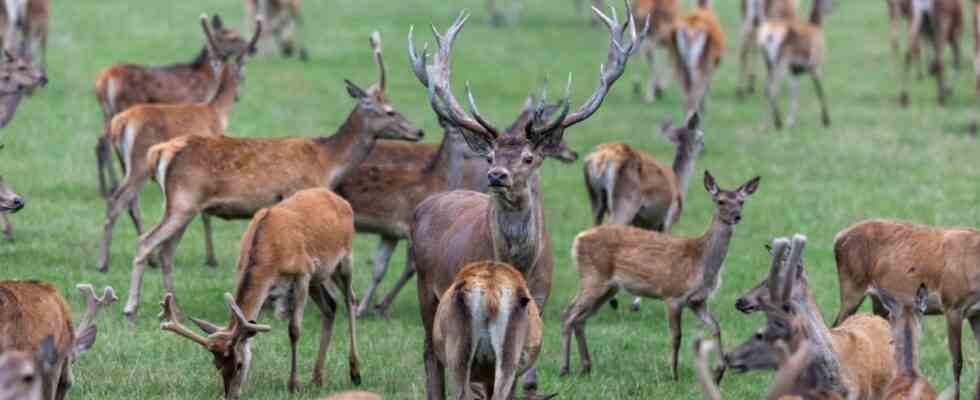Venison is now in season on the menus of many inns, and the hunt for wild boar, roe deer and now red deer is on in the woods. Large amounts of deer meat also come from abroad – especially from New Zealand, the largest exporter of deer meat in the world. The farmers there keep the game in large enclosures and, according to the Deer Industry Association, also supply Edeka and Rewe.
In Bavaria there are around 2,400 farmers who keep red and fallow deer as meat suppliers on fenced pastures – more than in any other federal state. Martin Biegerl is one of them. In Schönsee in the Bavarian Forest he has an “adventure farm” where he keeps horses and half a dozen cattle, ostriches, pigs, sheep and geese as livestock – and a herd of red deer. In addition to the top deer and his companion, there are almost 60 hinds with their offspring in a 4.5-hectare enclosure, where they live outdoors all year round.
Is it economically worth it? “You can’t look at the hourly wage,” says Biegerl. A full-time farmer cannot make a living from game alone. Unlike in New Zealand, most of the enclosures in Bavaria are only between two and three hectares in size. Farmers often use areas that are difficult to farm, such as those with steep slopes. “Or if you don’t want to do factory farming anymore. Like us.”
As a rule, game keepers market their meat directly, says Biegerl, who is deputy chairman of their state association. The gastronomy tends to buy from hunters or in the trade, which is cheaper. Direct marketing is easy, especially for game keepers near the big cities, and they also get better prices than in the provinces. Biegerl also sells almost everything directly from the farm or online. Farmers who don’t have the time or customers for direct sales can sell their meat to a producer group that the association founded in the Upper Palatinate.
“Since Corona, the demand has grown enormously.”
“The main marketing times for the approximately 500 tons of game meat from Bavarian enclosures are the months of September to December,” says the Bavarian Ministry of Agriculture. Venison is more expensive than beef, but is popular between autumn and Christmas as a flavorful, low-fat locally sourced meat. “Demand has grown enormously since Corona,” says Biegerl. “A few years ago, per capita consumption nationwide was a good 600 grams, today it’s around 900 grams.” However, demand is now falling again.
“On average, each inhabitant in Germany consumed 9.4 kilograms of beef, 31.0 kilograms of pork and 13.1 kilograms of poultry meat,” said the Federal Office for Agriculture and Food for 2021. In comparison to the 52 million pigs and three million cattle that were slaughtered in Germany last year, the game is hardly significant. According to the German Hunting Association, 1.3 million deer, 688,000 wild boar and 143,000 red and fallow deer were shot in the local forests. Nationwide, this resulted in 19,400 tons of game worth 202 million euros. But the market wants more. Almost the same amount is imported, mainly from Eastern Europe, New Zealand and Spain. “The degree of self-sufficiency in game meat in the Federal Republic of Germany is 60 percent,” said the Bavarian state farm Pfrentschweiher.
In the Middle Ages and early modern times, hunting deer and wild boar was a privilege of the high nobility and high clergy. Fallow deer were also kept in moats or in enclosures. In the 1970s, Bavarian farmers began to keep fallow and red deer in enclosures. In Pfrentschweiher in the Upper Palatinate, the Free State set up a large teaching and experimental enclosure. Around 36,000 breeding animals fallow and red deer are now kept in Bavaria on an area of 5,600 hectares. From the point of view of environmentally friendly grassland management, more is desired, the state estate said.
The Bavarian game reserve has nothing to do with “the mast deer gates in New Zealand,” said Hannah Reutter from the Bavarian Hunting Association. Unfortunately, very few consumers know “how the animals are kept and killed overseas”. In Bavaria, wild game are kept outdoors all year round, feeding on grass, clover and herbs and given hay in winter. “The law regulates that game may only be killed in the pasture with a bullet,” says Biegerl. If an animal is shot at twelve or 18 months, it has lived well in the pack.

